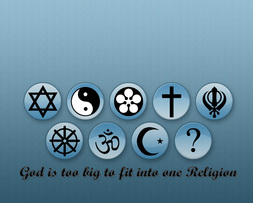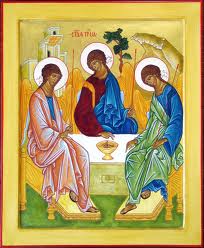
- Richard Rohr used a phrase in his daily meditations recently that got me thinking. Rohr said 'God is another word for the heart of everything'. This makes sense to me and I have often wondered if there's a difference between life and God whom all religions see as the source and end of all life.
I find God language difficult. No matter what religions say about God being Mystery they mostly talk of God in anthropomorphic terms so that it's difficult not to imagine Him or Her as a person somehow or other beyond creation, looking down on human history. This is the kind of God that's rejected by humanists and atheists. Some of them might be surprised to find that many religious people also reject this image of God. Mystics tell us that the only true response to knowing or speaking of God is silence. But St Augustine says we have to say something even if we know what we say is inadequate. So how do we speak of God?
The problem with religions is that they think their way of talking of God is the only way and cut themselves off from insight by ignoring or refusing to consider the insights of others. And if God is the heart of everything, then the religious insights about God must contain some insights about life.
Take the Christian belief in Trinity. Trying to explain three persons in one God is very difficult and I have heard theological explanations that seem just nonsensical. But when I look at Rublev's ikon of the Trinity I am drawn to participate in a life that is essentially communal. This insight therefore tells me that community is at the heart of everything, something we know is a reality from modern physics and science. Islam puts its emphasis on the oneness of God, the oneness at the heart of everything, and we know that this too is true from science. Any understanding of God must keep in balance these two seemingly contradictory insights. But science also tells us that such contradictions are also part of our universe. Islam tells us that there is no God but God and to see God as the heart of everything is to see that the one thing necessary is to commit ourselves to developing, promoting and protecting life within our created world and human community. Judaism's insight is that God, the heart of everything, brings life, freedom and human flourishing from seemingly desperate situations. As it says in the psalm ' bless the Lord who leads us into life'.
Eastern religions have their own take on God. Hinduism is often thought of as polytheistic because there is a wide pantheon of deities, with their own myths and rituals. But Hindus know that these are creations of the mind, representing the many faces of a reality which is beyond description. The famous phrase from the Rg Veda " the Real is one though known by different names" sums up the Hindu position. And Buddhism does not talk in terms of God, fearing anthropomorphisms which are taken literally though it does believe in an underlying reality which some schools call buddha-nature.
So for me different religions have something unique to tell us about God and our understanding can only be enriched by being aware of them and seeing how they lead us into life. They are like maps or paths that can lead us into an experience of the underlying reality at the heart of everything. The danger is in mistaking the map for the territory as Alfred Korzybski famously said.



 RSS Feed
RSS Feed
